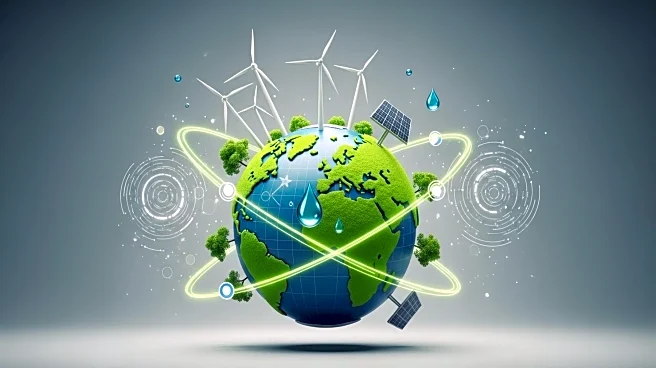What is the story about?
What's Happening?
Chinese green technology companies have committed over $227 billion to overseas manufacturing projects, highlighting China's expanding influence in the global clean-tech sector. This data, compiled by the Net Zero Industrial Policy Lab at Johns Hopkins University and Boston University's Global Development Policy Center, indicates a significant increase in investments since 2022. The China Low Carbon Technology FDI Database tracks these projects, which include batteries, solar modules, wind turbines, electric vehicles, and emerging hydrogen technologies. Notably, more than 387 projects have been identified, with over 80% announced in the past three years. In 2024 alone, a record 165 projects were unveiled. The investments are geographically diverse, with ASEAN countries being primary destinations, while the Middle East, North Africa, Europe, Latin America, and Central Asia are also attracting significant attention.
Why It's Important?
The surge in Chinese clean-tech investments abroad underscores China's strategic role in the global transition to renewable energy. This expansion could reshape global supply chains, particularly in regions like ASEAN, MENA, and Europe, which are becoming key hubs for clean-tech manufacturing. The investments are not only about market access but also about securing raw materials and export opportunities. For host countries, these projects offer economic growth potential but also require careful management to ensure technology transfer, environmental protection, and local economic benefits. The scale of these investments, with many projects valued over $1 billion, suggests a shift towards larger, more impactful clean-tech initiatives that could influence global energy policies and market dynamics.
What's Next?
As Chinese firms continue to expand their clean-tech footprint, host countries will need to enhance infrastructure, such as grids and ports, to accommodate these large-scale projects. Governments may also need to offer targeted incentives like tax holidays and concessional land to attract and sustain these investments. Additionally, there is a need for policies that ensure local value addition and environmental safeguards. The ongoing development of specialized clean-tech hubs in countries like Indonesia, Morocco, and Hungary indicates a trend towards regional specialization, which could lead to increased competition and innovation in the global clean-tech market.
Beyond the Headlines
The expansion of Chinese clean-tech investments raises questions about the geopolitical implications of such a significant shift in global energy dynamics. As China strengthens its position in renewable energy markets, other countries may need to reassess their energy strategies and partnerships. The focus on technology transfer and local content rules also highlights the importance of balancing foreign investment with domestic industrial growth. Furthermore, the environmental impact of these projects, particularly in resource-rich regions, will require ongoing monitoring and regulation to ensure sustainable development.

















